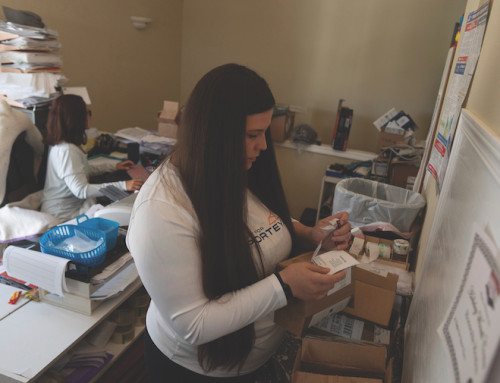A Fifth District Court of Appeals panel affirmed the conviction of a man on telecommunications fraud and theft charges after he transferred more than $36,000 to his own bank account from the Newark business employing him.
The three-judge panel overruled John Abraham’s assertion that the evidence was insufficient to convict him of the charges, stemming from the electronic theft of funds from Whiskey River Soap.
“Abraham was using funds from the company account for things like going out to bars and taking people out, and did not stop that behavior despite (the business owner’s) request that he do so,” Presiding Judge William Hoffman wrote for the 3-0 panel. “The state additionally presented documentation that Abraham’s later scheme consisted of double payments to vendors — one to the vendor and one in the name of the vendor but deposited into his personal account via electronic transfer.”
According to a summary of the case, Abraham was in a domestic relationship with Tabitha Wilson, the owner of Whiskey River Soap. The couple lived together and had children together.
She founded the business in 2015.
Abraham was employed by Whiskey River Soap, with his role in the business evolving over time. He ultimately began handling the business’ finances — billing, payroll, vendor payments, accounting and taxes, summary details.
In 2019, Abraham requested Wilson grant him the ability to make electronic transfers to pay vendors and sign paychecks himself. Wilson agreed and Abraham completed the required training through the company’s bank.
Wilson discovered at the close of 2021 that Abraham had devised a scheme to transfer company funds into his own bank account via electronic transfer.
She noticed Abraham would pay a vendor, then make a second payment for an identical amount and in the name of the vendor, but deposit the payment into his own personal bank account. Abraham made five separate deposits, ranging in amounts from $2,000 to $12,152, during a two-month period starting in October.
She fired Abraham and reported the theft to the Newark Police Department, summary continued.
Abraham was charged with one count of telecommunications fraud and five counts of theft at the conclusion of the police investigation.
He pleaded not guilty to the charges and opted to proceed to a bench trial.
After hearing the evidence, the trial court found Abraham guilty as charged.
Abraham was sentenced to three years of community control and ordered to pay restitution to Whiskey River Soap.
He subsequently filed an appeal of the lower court ruling.
“Abraham’s sole assignment of error proports to challenge the sufficiency of the evidence,” Hoffman wrote. “As noted by the state, however, Abraham’s arguments appear to challenge the weight of the evidence. In the interest of justice, we address both.”
The panel noted that Abraham never denied taking the funds through electronic transfer, yet he conceded that no official partnership agreement existed between he and Wilson.
“But Abraham insists a partnership existed anyway,” Hoffman continued. “He supports his argument by providing the legal test for the existence of a partnership under R.C. 1775.06, but Abraham never raised this argument below. It is well settled that arguments not raised in the trial court are forfeited on appeal. Had Abraham raised this theory below, the trial court could have addressed it. By failing to do so he has forfeited the same on appeal.”
The testimony presented at trial also supported the court’s verdict, with the state providing documentation showing Wilson was the sole owner of the company and Wilson testifying that she had told Abraham multiple times that he was not to use the funds out of the company’s operating account for his personal use, the panel reasoned.
“Abraham’s own testimony supported the trial court’s verdict,” Hoffman wrote. “He admitted his motivation for taking the money was the fact that he was having an affair and his concern for how Wilson would react is she found out. He testified he began taking money to ‘protect himself’ in the event she found out. Abraham further testified he could not be placed on the corporate paperwork because of a ‘tax issue’ in his past, and had been pressuring Wilson to put something in writing making him a half owner, all demonstrating his knowledge that he was not a half owner.”
Nor did Abraham deny the vendor payment scheme in which he transferred company funds to his own bank account, the panel noted.
“Given this evidence, the trial court as the finder of fact could have easily concluded that Abraham’s surreptitious movement of the money weighed against his claim that he had carte blanche access to the money as a co-owner. We therefore conclude Abraham’s convictions are supported by sufficient evidence and are not against the manifest weight of the evidence.”
Fifth District judges Andrew King and Robert Montgomery concurred with Hoffman’s opinion.









